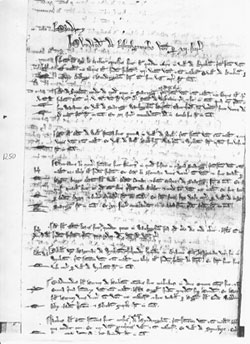This is a copy of a parchment roll surviving in the public record office. just 1/565
It is a record of crown pleas of the general Eyre of 1250, in the 34th. year of the reign of Henry III, taken in Norfolk. The Eyre was a periodic circuit of justices who had been commissioned by the king to hear all manner of civil & crown pleas such as felonies, protection or violation of liberties & privileges, murders etc. as well as auditing the royal revenues and inspecting county administration. The cases were presented by elected jurors representing hundreds (administrative subdivisions of the shire) and they had to answer the articles of the general Eyre - questions put to them by the justices on law & order in their area. The visits of the justices were infrequent so these cases may represent a span of a number of years.
This system of Justices in eyre was introduced in 1166 but was effectively abandoned in 1294.

| Ricardus filius Roge le Archer oppressus fuit sub quodam muro in villa de Binham. Primus inventor venit et non malecreditur nec aliquis alii. Judicum infortuniam. iiii vicini venerunt et non malecreduntur. Et villa de Binham Syvekey Dallinge et Hindringham sepultaverunt cum sine visus coronatore Ideo in misericordia. | Richard son of Roger the Archer was crushed under a certain wall in the village of Binham. The first finder came and was not suspected, neither anyone else. Judgement misadventure. Four neighbours came and they were not suspected. The vills of Binham Stiffkey Dalling and Hindringham buried him without the view of the coroner [without the coroner seeing the body]. Therefore they are in mercy. [ at the mercy of the court; i.e. liable to a fine.] | |
| Adam de Foreston cecedit de quodam equo in Snaring ita quod nuper obiit. Primus inventor venit et non malecreditur, nec aliquis alii. Jiudicum infortuniam. Precium equi v. marci Unde quod vicecomite rec. Simone de Wyktone r(eceptor?) et sit in misericordia quia cepit predictum equum sine waranto. Et villa de Snaring Walsingham Hogton Thursted non venerunt sicut venire debeant ad inquisitione fac(iendum) ideo in misericordia. Et xii juratores concelaverunt dedodando in botulo suo ideo in misericordia. | Adam of Foreston fell from a certain horse in Snoring so that he recently died. The first finder came and he was not suspected, nor anyone else. Judgement misadventure. Price of the horse 5 marcs. Whence that is to be received by the sheriff. Simon of Wighton (is receiver?) and thus he is in mercy because he took the aforesaid horse without warrant. And the villages of Snoring, Walsingham, Houghton and Thursford did not come thus they must be made to come to the inquisition, therefore they are in mercy. And 12 jurors concealed the deodand* in their/his bottle, [Saxon for a dwelling]. Therefore they are in mercy.
*A personal chattel, which having been the immediate occasion of the death of a person, was forfeited to the crown to be applied to pious uses. [Shorter OED] |
|
| Agnes filia Radulfi de Wells inventa fuit morta in villa de Wells. Primus inventor venit et non malecreditur et iiii. vicini venerunt et non malecredunter. Et villa de Wells, Halkham Warham et Wychton septultaverunt ipsam sine visu coronatore. | Agnes daughter of Ralph of Wells was found dead in the village of Wells. The first finder came and was not suspected, and 4 neighbours came and were not suspected.And the villages of Wells, Holkham Warham and Wighton buried her without the view of the coroner. |